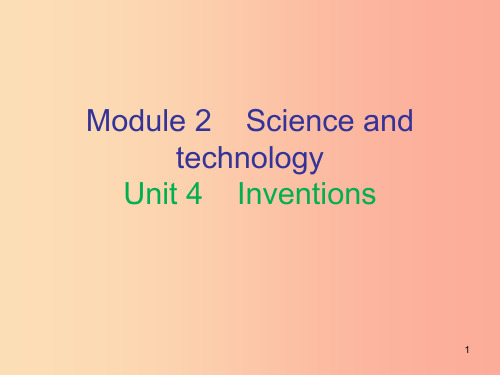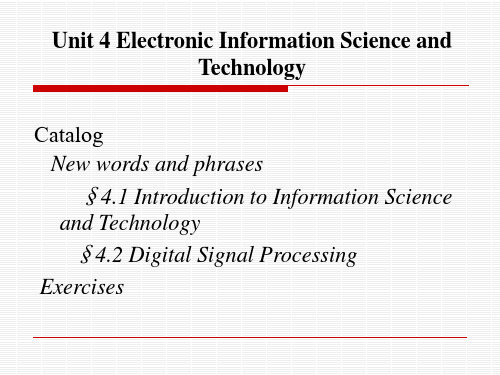Unit4 Science and technology 复习课件
- 格式:ppt
- 大小:212.00 KB
- 文档页数:21





Unit four Science and technologyPart one Preparation:Useful information:Science is knowledge of facts, laws and relationships that is obtained through systematic observation and experimentation. What we think of science is often the exact sciences like biology, chemistry, and physics. But many other branches of science have developed over the past centuries. Sociology and psychology, for example, are not exact science although their findings are based on the principles of scientific investigation.The technological changes that took place in the 20th century revolutionized virtually every aspects of life from communication to material comfort. In the space of two or three generations, people witnessed major advances in medical research, nuclear energy and space exploration. In the early part of the century, it seemed that science and technology could do nothing but good. People had implicit faith in scientific progress. However, wars, pollution and new diseases have undermined our confidence. The consequences of technological innovations have not always been positive and the moral and political choices regarding new inventions have often been questionable. Despite the negative reactions, which many technogical inventions have generated in recent years, some people still regard science in a positive light and look forward to waking up in the distant future. Such is the case for people who believe that liquid nitrogen holds the key to the long-term preservation of the body. These people often believe that death is merely an illness, which science will eventually be able to cure. Their hopes seem strange today. But who knows what the future will bring?Activity 1:Cloudy Days in Tomorrowland. 10 minutes for this part. Work in groups and compare each predication with what actually happened.(Notes to the teacher: In doing this activity, the teacher should try to draw the students' attention towhat actually happened.)Notes:1) Wilbur Wright's prediction:Orville Wright (1871 - 1948) and Wilbur Wright (1867 ~ 1912) are famous for making the first powered flight in their aircraft in 1903, at Kitty Hawk, North Carolina.2) H.G. Wells' prediction:Herbert George Wells (1866 - 1946) was an English novelist. After studying biology with T.H- Huxley, he wrote some of the earliest science-fiction novels, such as The Time Machine (1895) and The War ofthe Worlds (1898). These combined political satire, warnings about the dangerous new powers of science, and a hope for the future.The prediction means;I don't think that submarines will do anything except cause people to die (because of the lack of air) and move about helplessly in water.H. G. Wells failed to predict the important role that submarines have played.3) Ferdinand Foch's prediction:Ferdinand Foch (1851-1929) was a French general. He strongly supported the use of offensive warfare, which resulted in many of his 20th Corps being killed by German machine-guns in August, 1914. He became Supreme Commander of all Allied Forces on the Western Front in early 1918, and served as the senior French representative at the Armistice negotiations.He failed to predict the role of the airplane in military affairs.4) Horace Rackham's prediction:Henry Ford (1863 - 1947) was an American industrialist and maker of the first motorcars. He setup the Ford Motor Company in 1903, designed the famous Model T car in 1908 and over 15 million cars had been sold before the model was discontinued in 1928. He is known as one of the richest, most successful American businessmen.5) Dr Lee de Forest's prediction:Lee de Forest (1873-1961) was an American inventor who was a pioneer in the development of radio communication.He failed to predict the magic power that science can make. Man can now go to the moon on space flight.6) William Orton's prediction:Alexander Graham Bell (1847 - 1922) was a Scottish scientist and inventor who lived in the US and Canada, best known for inventing the telephone in 1876. He also started the Bell Telephone Company.7) Popular Mechanics' prediction about the size of computers:The first computers weighed several tons.8)Kenneth Olsen's prediction:Kenneth OIsen (1936- ) is a US computer entrepreneur.He failed to predict the widespread use of computers beginning in the 1980s.9) Lord Kelvin's prediction:Sir William Kelvin (1824 - 1907) was an English physicist and inventor. Kelvin failed to predict the widespread use of radio in the 20th century. 10) Darryl F. Zanuck's prediction;Darryl F. Zanuck (1902 - 1979) was an American motion-picture producer and powerful studio executive, who led the 20th Century Foxfilm studio from the mid-1930s through the mid-1950s, in which were among its most successful decades,He failed to predict the popularity of TV throughout the world.Activity 2: Making Your Own PredictionsSample answers1) MedicineIn the 21st century, cancer and AIDS will no longer be considered deadly diseases. Wonder drugs will be developed to cure all kinds of diseases. Medicine will be developed to prevent aging, and people will live much longer than now. Technology will develop so that a dead body can be kept for several years and then be revived.There will be all kinds of advanced equipment in hospitals and doctors or nurses will be able to monitor the patients without going to the wards. Thus "visits" can be more frequent. The hospital wards will be clean and bright, but the medical costs will be much higher.2) Computer technologyComputer technology will be greatly developed in the 21st century. More people will have access to computers. There will be computers in almost all families, offices, even small street-side stores. People will be able to work without leaving home. People will be able to order all kinds of things through computer and delivery will be much faster. A lot of sales clerks will be laid off.The future computers will be smaller in size and faster in speed. Pocket computers will be able to come into being in the near future and the price will be lower. More and more people can afford computers and multimedia computer technology will gradually make television, VCD and DVD disappear.3) EducationThere will be no national entrance exam and everyone will have the chance to receive college education so long as they can afford it. There won't be so many lectures on the college campus. Students can learn by themselves using computer software, and watching educational programs on TV. Students will have more freedom in choosing and changing their majors.Education in the future will be available to people of all ages. A Bachelor's degree may become the basic requirement for all professions. Part 2: Reading-centered activities.I. Pre-ReadingI. Pre-ReadingQuestions: 1. What do you feel about life in the modern world? Would you rather have lived in any of the less scientific ages thathave preceded ours? Why?2. Would you rather live in the future or are you happy to be living now? Why?Ss answers:1) I feel it's really nice to live in the modern world. In this modern world, there are so many things that were not available in the past. Television, refrigerators, VCDs, DVDs, and computers make our life so colorful and enjoyable. I can't imagine a life without all these.On the one hand, I like to live in the modern world. The modern world provides us with so many wonderful things that our ancestors couldn't even dream of. But on the other hand, I find living in the modern world is a bit tiring. People are living at a fast pace and there is a lot of competition and challenges. I find myself always in a rush.2) I don't want to live in the future. I'm the sort of person who is satisfied with what I have. From what I read in books, magazines, newspapers, etc., I somehow get the feeling that people in the future will become more indifferent to each other. Besides, there will be less and less communication between people in the future and the distance between people will be greater. So I'm happy to be living now.I like living in the future world. With the development of modern science and technology, more and more inventions will be made and we can have access to a greater variety of things. I once read a science fiction novel depicting the future world as one where people lived in harmony and peace. This is exactly what I want. I hate wars and I feel sorry for the victims of wars.II Passage Reading Too Fast? (太快了吗?)Activity 1: vocabulary. Lead Ss to read the words and phases.1.adaptable: able to change so as to be suitable for new needs, differentconditions, etc.e.g. I think she’ll cope with the change very well; she is veryadaptable.adapt …to…: He could n ot adapt his way of life to the company.adept: good at, or skillful e.g. She was adept in music.2.bewildering: confusing esp. because many different things happen atthe same time or there are many choices at the same time.3.contradict: (1)to be contrary to; disagree with; e.g. Your actionscontradict your principles.(2) to assert or express the opposite of (a statement).e.g. It's difficult to contradict someone politely.彬彬有礼地驳斥别人是难以做到的。

大学英语2Unit 4 Science and Technology主题:Unit 4 Science and Technology学习时间:2016年5月23日-5月29日内容:我们这周主要学习Unit 4中语法能力和写作能力的相关内容。
希望通过下面的内容能使同学们加深对相关知识点的理解。
一、学习要求1.了解省略句的基本句型;2.学习篇章连贯的技巧。
二、主要内容1.省略句的基本类型在英语中,有时为了避免重复,使语言简练紧凑,在不损害句子结构或不引起误解的原则下,常常省略句子中的一个或几个成分,这样的句子叫省略句。
常见的省略句有以下几种类型:⑴简单句的省略①省略主语e.g. (You) Had a good time?(It) Sounds like a good idea.(I) Thank you for your help.(I) See you tomorrow.(I) Beg your pardon.②省略谓语e.g. The river was deep and the ice (was) thin.He is a teacher, and his wife (is) a doctor.They learn French and we (learn) English.(Is there) Anything I can do for you?③省略宾语:在对话或并列句中,如果主语、谓语不同,而宾语相同,则常省去相同的宾语部分。
e.g. Let's do the dishes. I'll wash (dishes) and you'll dry (dishes).Tom enjoys dancing, but Peter hates (dancing).④省略表语e.g. — Are you thirsty? — Yes, I am (thirsty).His brother isn’t lazy, nor is his sister (lazy).⑤同时省略几个成分e.g. (Have you) Got any ink?Let’s meet at the same place as (we met) yesterday.⑥省略其它e.g. I've studied English (for) five years.She is going to her uncle's (house).⑵并列句的省略:两个并列句中,后一个分句常省略与前一分句中相同的部分。
Unit 4 The Science and technology 【学习目标苑】1.学习有关科技的知识信息。
2.谈论可能性。
3.学会使用情态动词:had better, should, ought to。
4. 写一封关于个人见解的信。
【知识目标苑】【导练苑】Ⅰ. warming up , Listening and Speaking词汇1.Technology n.[U]工艺,技术(总称)Science has contributed much to the modern technology.科学对现代技术做出了很大贡献。
Science and technology科技辨析:technology常指某种具体的技术,技艺(总称)→technologist技术专家technique指技巧→technician技师the technique of automation自动化技术2.Telecommute vi.远距离工作Telecommunication pl.n.通信,电信学前缀tele-表示远距离的,远的,电视的,通过电话的telescopic望远的 telesales电话销售的teletext图文电视 telepathy传心术It is possiblefor him to telecommuteat home through internet.他在家通过因特网远距离工作是可能的。
3.effect n.结果,影响,财产或家产(pl.form)vt.实现,使生效,引起have a effect on对……有影响This medicine had no effect on him.这药对他无效。
His opinion effected a change in the plan.他的意见使计划变更。
take effect生效,起作用bring/carry/put into effect实行,贯彻辨析:affect sth.=have a effect on sth.Effect sth.=make sth happen4.happen vi.(偶然)发生(后接不定式)碰巧,巧遇How did the accident happen?事故是怎么发生的?An earthquake happened when I happened not to be there.我碰巧不在那里的时候发生了地震。